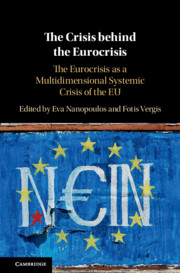Book contents
- The Crisis behind the Eurocrisis
- The Crisis behind the Eurocrisis
- Copyright page
- Dedication
- Contents
- Contributors
- Preface
- Acknowledgements
- Introduction The Elephant in the Room
- 1 There Is No (Legal) Alternative
- Part I The Crisis as a Crisis of the EU’s Identity
- Part II The Crisis as a Crisis of the EU’s Political and Democratic Legitimacy
- 5 Authoritarian Liberalism
- 6 The Inherently Undemocratic EU Democracy
- 7 Europe and Constituent Powers
- 8 ‘Who’s Afraid of the European Demos?’
- 9 Can Public and Voluntary Acts of Consent Confer Legitimacy on the EU?
- Part III The Crisis as a Crisis of the EU’s Economic Model
- Part IV The Crisis as a Crisis of the EU’s Social Character
- Part V Joining the Dots and the Way Forward
- Index
9 - Can Public and Voluntary Acts of Consent Confer Legitimacy on the EU?
from Part II - The Crisis as a Crisis of the EU’s Political and Democratic Legitimacy
Published online by Cambridge University Press: 07 July 2019
- The Crisis behind the Eurocrisis
- The Crisis behind the Eurocrisis
- Copyright page
- Dedication
- Contents
- Contributors
- Preface
- Acknowledgements
- Introduction The Elephant in the Room
- 1 There Is No (Legal) Alternative
- Part I The Crisis as a Crisis of the EU’s Identity
- Part II The Crisis as a Crisis of the EU’s Political and Democratic Legitimacy
- 5 Authoritarian Liberalism
- 6 The Inherently Undemocratic EU Democracy
- 7 Europe and Constituent Powers
- 8 ‘Who’s Afraid of the European Demos?’
- 9 Can Public and Voluntary Acts of Consent Confer Legitimacy on the EU?
- Part III The Crisis as a Crisis of the EU’s Economic Model
- Part IV The Crisis as a Crisis of the EU’s Social Character
- Part V Joining the Dots and the Way Forward
- Index
Summary
Legitimacy is essential for any polity that seeks to exert law-making authority over its people. Although the EU is not a single state, it is a polity that has to obtain legitimacy for its power to make laws affecting some 500 million people across twenty-eight Member States (soon to be twenty-seven pending UK exit). And yet in the eyes of EU citizens the Eurozone crisis and Brexit vote call into question the EU’s legitimacy as it cannot guarantee prosperity for all its peoples or shield against economic and political uncertainty. There is growing unease and disaffection, particularly among southern EU states’ voters, and divisions between core–peripheral Member States, with emerging alternative popular representation structures (e.g. Podemos in Spain) and reappraisal of the EU, even among pro-EU politicians (e.g. the British left-wing, albeit historically deep divisions have remained since the membership referendum of 1975 with vocal Labour Eurosceptics such as Tony Benn and Jeremy Corbyn). In this context, ‘core’ Member States refers to the advanced economies and strong democracies including the original founding members (Belgium, France, Germany, Italy, Luxembourg and the Netherlands), and new members from the enlargement period between 1973 and 1995 (Denmark, Ireland, the UK, Greece, Portugal, Spain, Austria, Finland, Sweden).
- Type
- Chapter
- Information
- The Crisis behind the EurocrisisThe Eurocrisis as a Multidimensional Systemic Crisis of the EU, pp. 219 - 240Publisher: Cambridge University PressPrint publication year: 2019



